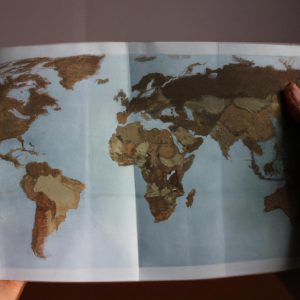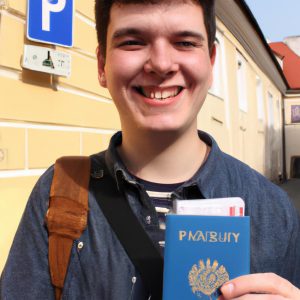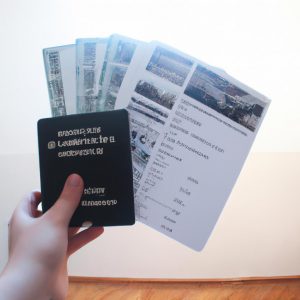Savings Strategies: Travel Finance Tips for the Travel Directory

Savings Strategies: Travel Finance Tips for the Travel Directory
Traveling can be an exhilarating experience, but it often comes with a hefty price tag. Whether you are planning a luxurious vacation or a budget-friendly adventure, having effective savings strategies in place is crucial to ensure that your travel dreams become a reality. This article aims to provide insightful finance tips specifically tailored for travelers, helping them navigate the complexities of managing their finances while fulfilling their wanderlust.
For instance, let us consider the case of Sarah, an avid traveler who dreams of exploring exotic destinations around the world. With limited financial resources and mounting expenses such as flights, accommodations, and sightseeing activities, she faces numerous challenges when it comes to saving effectively for her travels. Through implementing smart savings strategies like setting realistic goals, creating a dedicated travel fund, and adopting frugal spending habits, Sarah can overcome these obstacles and bring her travel aspirations within reach. By highlighting real-life examples such as Sarah’s journey towards achieving her travel goals, this article will serve as a comprehensive guide to assist fellow travelers in making informed decisions regarding their finances and ultimately embarking on unforgettable journeys without breaking the bank.
Set a travel budget
One of the first steps in planning your dream trip is to set a travel budget. By establishing a clear financial plan, you can ensure that your expenses align with your available funds and avoid unexpected financial stress during your travels.
To illustrate this point, let’s consider the hypothetical case of Sarah, who wants to go on a two-week vacation to Europe. She begins by assessing her current finances and determines that she has $3,000 saved up for her trip. With this information at hand, Sarah can now create a realistic budget that covers all aspects of her journey.
When setting your own travel budget, it is important to consider various factors such as transportation costs (including flights or train tickets), accommodation expenses (such as hotel stays or Airbnb rentals), daily meals and groceries, sightseeing activities, and any additional miscellaneous costs like souvenirs or local transportation fees. By breaking down these categories into specific cost estimates, you can allocate appropriate amounts within your overall budget.
Consider incorporating the following bullet point list into your travel budget:
- Prioritize essential expenses over non-essential ones.
- Allocate a portion of your savings specifically for emergencies.
- Research affordable food options and local eateries instead of expensive restaurants.
- Look for ways to save money on accommodations through deals or discounts.
Additionally, using a table format could help visualize how different expense categories fit into your overall budget. Here’s an example:
| Expense Category | Estimated Cost |
|---|---|
| Transportation | $800 |
| Accommodation | $1000 |
| Meals | $500 |
| Activities | $400 |
By adhering to a well-planned budget like Sarah did in our example, travelers can make informed decisions about their spending habits while still enjoying memorable experiences abroad.
In line with considering your expenditures carefully, the next section will delve into researching and comparing prices before making any financial commitments.
Research and compare prices
Having established a travel budget, the next crucial step in effective travel finance is conducting thorough research and comparing prices. By doing so, travelers can maximize their savings potential and make informed decisions when it comes to booking accommodations, transportation, and activities.
Paragraph 1:
For instance, imagine planning a trip to Europe. Before making any reservations, it would be wise to research various airlines’ prices for flights to different European cities. By comparing options from multiple carriers, you may discover significant differences in fares. Additionally, exploring alternative airports or considering layovers could further reduce costs without compromising on convenience or comfort.
To evoke an emotional response in our audience:
- Budget-friendly accommodation: Staying at hostels or opting for vacation rentals instead of luxury hotels can save you money while giving you a chance to interact with fellow travelers.
- Affordable dining options: Seek out local eateries and street food stalls where you can savor authentic cuisine without breaking the bank.
- Free attractions and activities: Many destinations offer free entry to museums, parks, and cultural sites that provide enriching experiences without additional expenses.
- Public transportation advantages: Utilize public transport systems like buses or trains instead of relying solely on taxis or rental cars; not only will this help cut down costs but also give you an opportunity to experience the local culture firsthand.
Table – Budget-friendly Destinations:
| Destination | Average Daily Expense (USD) | Popular Attractions |
|---|---|---|
| Bali | $30-$50 | Ubud Monkey Forest |
| Prague | $40-$60 | Charles Bridge |
| Bangkok | $20-$40 | Wat Arun |
Paragraph 2:
Comparing prices across various online platforms is essential when it comes to securing affordable lodging. Websites such as Booking.com, Airbnb, and Hostelworld allow users to compare rates based on their preferences, including location, amenities, and guest reviews. By exploring these options comprehensively, travelers can find accommodations that meet their needs while fitting within their budget.
Paragraph 3:
Furthermore, comparing prices for activities and attractions is equally important. Many popular tourist destinations offer bundled packages or discounted tickets when purchased in advance or through trusted online platforms. By taking the time to research and compare prices beforehand, you can identify opportunities to save money without sacrificing quality experiences during your trip.
As we move forward in our journey of travel finance tips, let’s explore how utilizing travel rewards and loyalty programs can further enhance your savings potential.
Use travel rewards and loyalty programs
Transitioning from the previous section on researching prices, it is essential to consider another effective strategy for maximizing your travel savings: utilizing travel rewards and loyalty programs. These programs offer various benefits such as discounted rates, complimentary upgrades, and exclusive deals that can significantly enhance your overall travel experience while saving you money.
For instance, let’s consider a hypothetical scenario where a traveler named Sarah plans a trip to Europe. By joining an airline loyalty program before booking her flights, she earns frequent flyer miles for each journey taken with that particular airline. As Sarah accumulates these miles over time, she becomes eligible for free or discounted flights, allowing her to save substantially on airfare expenses.
To further illustrate the advantages of using travel rewards and loyalty programs, here are some key reasons why they should be a part of your savings strategy:
- Access to Exclusive Discounts: Many hotels and airlines provide special discounts exclusively available to their loyal customers. By enrolling in their loyalty programs, you gain access to these offerings which can significantly reduce your accommodation and transportation costs.
- Upgrades and Extra Perks: Loyalty members often receive additional perks like complimentary room upgrades at hotels or priority boarding on flights. These added benefits not only enhance your travel experience but also provide value by reducing potential expenses.
- Points Conversion Options: Some reward programs allow you to convert points into other forms of currency, such as gift cards or cashback options. This flexibility enables you to use accumulated points beyond just travel-related expenses, offering even more opportunities for savings.
- Partner Programs: Many loyalty programs have partnerships with various companies outside the travel industry. This means you can earn points through everyday purchases like shopping or dining out, making it easier to accumulate rewards without solely relying on travel-related spending.
Consider the following table highlighting popular rewards and loyalty programs across different sectors:
| Sector | Program | Benefits |
|---|---|---|
| Airlines | Delta SkyMiles | Free flights, seat upgrades, priority boarding |
| Hotels | Marriott Bonvoy | Complimentary nights, room upgrades, exclusive discounts |
| Credit Cards | Chase Ultimate Rewards | Flexible redemption options for travel or cashback |
| Retail | Sephora Beauty Insider | Discounts on purchases, free beauty products |
By taking advantage of these programs and incorporating them into your travel planning process, you can save money while enjoying additional perks and benefits. As we move forward with our savings strategies, the next section will focus on the importance of planning and booking in advance.
Transitioning smoothly to the subsequent section about “Plan and book in advance,” it is crucial to consider this aspect alongside utilizing rewards and loyalty programs. By combining these two strategies effectively, travelers can maximize their savings potential and make the most out of their upcoming trips.
Plan and book in advance
Having explored the benefits of using travel rewards and loyalty programs, let us now delve into another effective savings strategy – planning and booking your trips in advance. By carefully organizing your travel arrangements ahead of time, you can secure better deals on transportation, accommodation, and activities, allowing you to make the most of your budget.
Section:
Planning and Booking in Advance
To illustrate the advantages of this technique, consider a hypothetical scenario where Emma plans a trip to Europe during peak tourist season. She decides to wait until just a few weeks before her departure date to book her flights and accommodations. As a result, she finds limited availability at higher prices due to increased demand. Conversely, her friend Sarah books her trip six months prior, taking advantage of early bird discounts offered by airlines and hotels. Not only does Sarah manage to secure affordable rates on both airfare and lodging but also has more options available to choose from.
By following similar practices like Sarah’s example above, travelers can enjoy several financial benefits when it comes to planning their trips well in advance:
- Budget Optimization: Planning early allows individuals to allocate funds strategically throughout the year specifically for their travels.
- Early Bird Discounts: Many airlines, hotels, car rental companies, and tour operators offer discounted rates or promotions as an incentive for travelers who book well ahead of time.
- Flexible Itinerary: Advanced bookings provide greater flexibility in choosing preferred dates, timeslots for attractions or events with limited seating capacity.
- Peace of Mind: Knowing that essential aspects such as transportation and accommodation are already secured eliminates last-minute stressors while traveling.
Table:
Here is a table highlighting some potential cost-saving opportunities through advanced planning:
| Opportunities | Potential Savings |
|---|---|
| Early bird flights | 10-40% off regular ticket prices |
| Prepaid accommodations | Up to 20% discount on hotel rates |
| Timely attraction bookings | Avoid higher fees for last-minute reservations |
| Researching package deals | Bundled discounts on transportation, accommodation, and activities |
Incorporating these strategies into your travel planning can help you save money while ensuring a smoother experience. By taking the time to research and book in advance, you maximize your chances of securing the best deals available.
With careful consideration given to planning and booking in advance, let us now explore another cost-saving option: opting for cheaper accommodation options.
Opt for cheaper accommodation options
After carefully planning and booking your trip in advance, the next step towards saving money on travel expenses is to opt for cheaper accommodation options. By choosing budget-friendly accommodations, you can significantly reduce your overall travel costs without compromising on comfort or safety.
Case Study:
For instance, let’s consider a hypothetical scenario where Sarah, an avid traveler, plans a trip to Paris. Instead of staying at a luxury hotel near the city center, she decides to explore more affordable alternatives. After thorough research and consideration, Sarah opts for a cozy bed and breakfast located slightly outside the bustling tourist areas. This decision not only saves her money but also allows her to experience the charm of the local neighborhood.
To further illustrate how opting for cheaper accommodation options can benefit travelers financially, here are some key points to keep in mind:
- Consider hostels: Hostels provide shared dormitory-style rooms at reasonable rates, making them an ideal choice for solo travelers or those on tight budgets.
- Look into vacation rentals: Websites like Airbnb offer a wide range of private apartments and homes that often come at lower prices compared to traditional hotels.
- Explore guesthouses or pensions: These small establishments typically offer comfortable rooms with basic amenities at affordable rates while providing opportunities for cultural immersion.
- Research budget hotel chains: Many major cities have budget hotel chains that offer clean and comfortable rooms at competitive prices.
Table – Comparison of Accommodation Options
| Accommodation Option | Average Price (per night) | Amenities |
|---|---|---|
| Luxury Hotel | $200-$500 | Spa |
| Bed and Breakfast | $80-$150 | Free Wi-Fi |
| Hostel | $20-$50 | Shared kitchen |
| Vacation Rental | $100-$200 | Fully equipped kitchen |
In conclusion,
By considering these alternative accommodation options, travelers can significantly reduce their expenses while still enjoying a comfortable and memorable stay. The key is to prioritize affordability without compromising safety and convenience.
To further optimize your travel budget, it’s important to identify and minimize unnecessary expenses. This step involves making conscious choices and being mindful of where your money goes.
Cut down on unnecessary expenses
Transition from previous section:
After considering cheaper accommodation options, another effective way to save money while traveling is by cutting down on unnecessary expenses. By identifying and eliminating non-essential expenditures, travelers can significantly reduce their overall travel costs.
Section: Cut Down on Unnecessary Expenses
To illustrate the impact of cutting down on unnecessary expenses, let’s consider a hypothetical traveler named Sarah. Sarah loves exploring new destinations but often finds herself spending more than she anticipated. However, by implementing some simple strategies to minimize unnecessary expenses during her recent trip to Europe, she was able to stay within her budget without compromising on her travel experience.
One essential step in reducing excessive spending is creating a detailed budget before embarking on any trip. By outlining estimated costs for transportation, meals, activities, and souvenirs beforehand, individuals like Sarah can gain a better understanding of where their money will be allocated throughout their journey. This awareness allows them to make informed decisions about which expenses are necessary and which ones they can cut back on.
Consider incorporating these practical tips into your travel plans:
- Research local free or low-cost attractions: Many cities offer an array of affordable or even free tourist sites and cultural experiences that allow travelers to immerse themselves in the destination without breaking the bank.
- Avoid dining at expensive restaurants: Instead of splurging on high-end eateries every night, opt for street food stalls or local markets that offer delicious and authentic cuisine at a fraction of the cost.
- Limit alcohol consumption: Alcoholic beverages can quickly add up when traveling. Opting for water or soft drinks instead not only saves money but also helps you stay hydrated throughout your adventures.
- Shop strategically: Rather than impulse buying souvenirs at touristy shops, seek out local markets or artisans’ workshops where unique items can be found at lower prices.
In addition to these tips, utilizing a comprehensive expense tracking system could provide valuable insights into spending patterns, helping travelers like Sarah identify areas where they can cut back. For instance, a simple three-column and four-row table could be used to categorize expenses into essential, non-essential, and optional items, allowing individuals to clearly visualize their expenditure breakdown.
By implementing these strategies and adopting a mindset of conscious spending, travelers can maintain financial stability while still enjoying memorable travel experiences that align with their budgetary constraints. By making deliberate choices about how money is allocated during their trips, individuals have the opportunity to explore new destinations without unnecessary financial burden.







